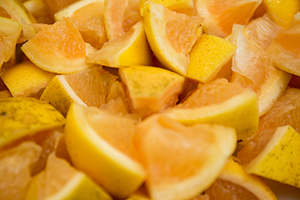Biopesticides: Horticultural Oils
Natural pest control with oils

Growing interest in organic gardening, coupled with risks associated with traditional synthetic products, has increased interest in natural products that can manage landscape and garden pests. Plant and petroleum-derived oils are one group of natural pest control products that can be successfully used in your garden.
On the positive side, natural products generally act quickly and have low toxicity. On the other side of the coin, natural products can sometimes be more expensive and harder to find than synthetic products. And while natural products tend to break down rapidly, reducing the risks to non-target organisms, that also means that precise timing and more frequent applications may be necessary. Of course, when misapplied, natural products can be just as effective in killing good bugs as bad.
Oils, Plant- and Petroleum-derived
Oils affect insects in several ways. When sprayed onto insects, oils can block the insects’ breathing holes (spiracles), suffocating them. Eggs are often targets of control with oils as they prevent gas exchange through egg membranes. Additionally, the fatty acids in plant oils may disrupt cell membranes and interfere with normal metabolism. Some oils may also have repellent or anti-feeding properties, or may clog insect mouthparts, which may reduce the chance that insects like aphids and leafhoppers will transmit viruses to plants.
Oils are most effective against small, soft-bodied insects and mites that are immobile or slow-moving such as aphids, scales, leafhopper nymphs, and whiteflies. For oils to work, the target pests should be thoroughly covered by the oil spray. Oils can’t prevent insect re-invasion since they lack residual activity and need to be reapplied.
Citrus Oils

Like the name suggests, citrus oils are extracted from citrus fruit peels and refined to make the insecticidal compounds d-limonene and linalool. Both of these compounds are generally regarded as safe for mammals by the United States Food and Drug Administration (FDA). These compounds evaporate readily from treated surfaces and have no residual activity. They are registered for use against fleas, aphids, and mites. These compounds also kill fire ant workers, several types of flies, paper wasps, and house crickets. Be sure to cautiously use these products to minimize leaf burn on sensitive plants.
Neem oil
Neem oil is extracted from the seeds of the neem tree and contains at least two compounds, azadirachtin and salannin, that kill insects, along with other unidentified compounds that have fungicidal activity. Neem works as a repellent, feeding deterrent, and/or growth regulator, depending on the formulation and the insect. It is most effective against actively growing, immature insects. Neem oil (70%) is used to manage powdery mildew but is less effective on black spot and other leaf spot diseases.
Other plant oils used as insecticides
You can find many insecticides that use combinations of different plant oils, plant extracts, and fish oils. The most common oils used in these products are garlic, canola, sesame, and soybean. Some herbal extracts include thyme, rosemary, peppermint, cinnamon, and clove.
Horticultural Oils
Horticultural oils, which are highly-refined, lightweight oils derived from petroleum, are effective against piercing-sucking insects and mites. As with any pesticide, carefully read the label to avoid damaging plants. Horticultural oil applications are not advised when outdoor temperatures exceed 90°F.
